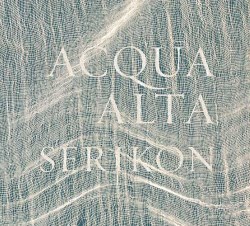
|
Acqua Alta
Giovanni GABRIELI (ca 1555-1612)
Canzon X á 8 [5:01]
Claudio MERULO (1533-1604)
Sanctus á 16 [3:00]
Alexander CAMPKIN (b. 1984)
Colour Blinds the Eye [9:25]
Adrian WILLAERT (ca 1490-1562)
De profundis [6:16]
Barbara STROZZI (1619-1677)
Salve Regina [9:46]
Dario CASTELLO (ca 1590-ca 1658)
Sonata duodecima, Libro II [7:49]
Giovanni ROVETTA (ca 1596-1668)
Domine Deus Noster [4:44]
Jan SANDSTRÖM (b. 1954)
Acqua Alta [19:44]
Andrea GABRIELI (ca 1532-1585)
Domine ne in furore (Psalm 6) [7:16]
Giovanni GABRIELI
Canzon II á 4 [3:00]
Omnes gentes plaudite manibus á 16 [3:23]
Serikon/Erik Westberg
rec. 5-8 February 2013, Studio Acusticum, Piteå, Sweden.
FOOTPRINT RECORDS FRCD073 [79:30]
Serikon is an ensemble which plays Renaissance music on period instruments, and also contemporary music written for the same instruments. With the emphasis in today’s music on breaking down borders and for musicians having the widest possible perspectives this is becoming an increasingly common phenomenon, though few do it as well as the examples on this recording. Acqua Alta means “high water”, and artistic director Daniel Stighäll is in part using this programme as a comment on our encroaching environmental peril. The focus is Venice, a city frequently flooded with the higher water levels of the sea.
The music of Andrea and Giovanni Gabrieli, Claudio Merulo and Adrian Willaert provides stunning examples of a time in which Venice was one of the main cultural capitals of Europe. You need only turn to the splendour of Merulo’s Sanctus ā 16 to enjoy the kind of ravishing sound which is the sonic fingerprint of the place and the period. The earlier Baroque is represented by Giovanni Rovetta, Barbara Strozzi and Dario Castello, with smaller-scale but no less enjoyable creations.
Mixing the ancient with the modern is an idea which works well, and expressing specially composed contemporary music with ‘antique’ instruments makes this disc rather special. British composer Alexander Campkin’s Colour Blinds the Eye creates the atmosphere of chanting monks with its often limited selection of pitches and open intervals. The text adapts a section of the Tao Te Ching, and the limitations of this framework are perfect for Campkin’s focused approach. Harmonies grow in layers at certain moments, but the emphasis is on a beauty of horizontal lines which join and occasionally clash with delicious dissonance.
The other modern piece here is Acqua Alta by the Swedish composer Jan Sandström, who has taken a text on Venice by American poet Meena Alexander. With striking sonorities from the chiming plucked strings, a texture of sustained sounds, interjecting winds imitating birds or other fauna and some superb solo and close-harmony choral singing this is a piece which creates a powerful atmosphere and remains long in the memory. Even at nearly twenty minutes there are no moments which feel like loose rambling, and if you were by chance to drop in at any point the feeling of being compelled to pull your car into the nearest layby and hear the rest of the piece properly is very strong indeed.
This CD is supplied with a thirty page booklet with plenty of photos, informative notes and all sung texts in their original language and English Translation. The recording is very good though not without a very few minor processing artefacts. Performed by some of the best Renaissance musicians in the world conducted by Erik Westberg, this is a gorgeous production which deserves your urgent attention.
Dominy Clements
 |
 |
|











